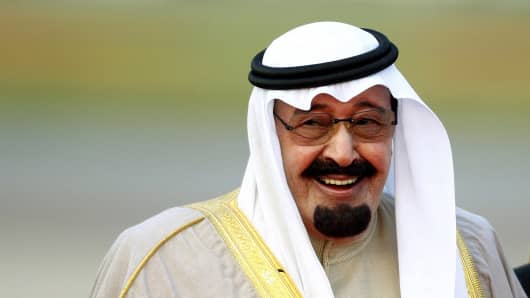http://www.cnbc.com/id/102292477
Saudi Arabia's King Abdullah bin Abdulaziz Al Saud has died at age 90, state television reported early on Friday, and his brother Crown Prince Salman bin Abdulaziz will succeed him as the new ruler of the world's top oil exporter.
King Salman, 79, immediately appointed his half-brother Muqrin as his crown prince and heir, a move seen to avert widespread speculation about the path of the royal succession.
State television said King Abdullah, who took power in 2005 after the death of his brother King Fahd, died of pneumonia. He was admitted to the hospital on December 31, state media reported at the time.
President Barack Obama expressed condolences and saluted the late king's commitment to close U.S.-Saudi ties.
"As a leader, he was always candid and had the courage of his convictions," Obama said in a statement. "One of those convictions was his steadfast and passionate belief in the importance of the U.S.-Saudi relationship as a force for stability and security in the Middle East and beyond."
"The closeness and strength of the partnership between our two countries is part of King Abdullah's legacy," the statement added.

Dylan Martinez | Getty Images
Saudi Arabia's King Abdullah.
The succession is largely expected to be smooth, as the Saudi royal family already announced in March that Salman would be next in line to the throne. But analysts say there could be implications for the oil markets.
Crude prices jumped after the news broke. U.S. benchmark WTI crude futures rose more than 2 percent to a high of $47.76 a barrel, while Brent crude futures rose as high as $49.80 a barrel.
"I think the problem for Saudi Arabia does not come from the domestic scene but instead comes from what's coming from around the region and of course the price of oil being as low as it is below $50 a barrel for them," said Firas Maksad, founder and managing director of Global Policy Advisors (GPA).
Saudi Arabia led OPEC's decision to maintain its production levels on November, triggering a further collapse in oil prices. Oil prices have plunged more than 50 percent since mid-2014, with Brent at $48.52 a barrel at Thursday's close, and Nymex crude trading at $47.62.
Weeks ago, when King Abdullah was reported to be seriously ill, Saudi watchers told CNBC that the country's oil, domestic and geopolitical policies should remain virtually unchanged when Salman takes over.
Salman, who has assumed many state duties while also serving as deputy prime minister and minister of defense, was relatively well-liked by regional neighbors and in Washington, according to Karen Elliott House, author of "On Saudi Arabia: Its People, Past, Religion, Fault Lines—and Future."
Abdullah, thought to have been born in 1923, had ruled Saudi Arabia as king since 2006, but had run the country as de facto regent for a decade before that after his predecessor, King Fahd, suffered a debilitating stroke.
Abdullah pushed cautious changes in the conservative Islamic kingdom including increased women's rights and economic deregulation, but made no moves towards democracy.
At stake with the appointment of Salman as king is the future direction of the United States' most important Arab ally and self-appointed champion of Sunni Islam, which has played a pivotal role in the messy aftermath of the Arab spring.
Abdullah played a guiding role in Saudi Arabia's support for Egypt's government after the military intervened in 2012, and drove his country's support for Syria's rebellion against President Bashar al-Assad.
Click here for the latest on the markets.
— Reuters contributed to this report.
(Courtesy: CNBC)
No comments:
Post a Comment